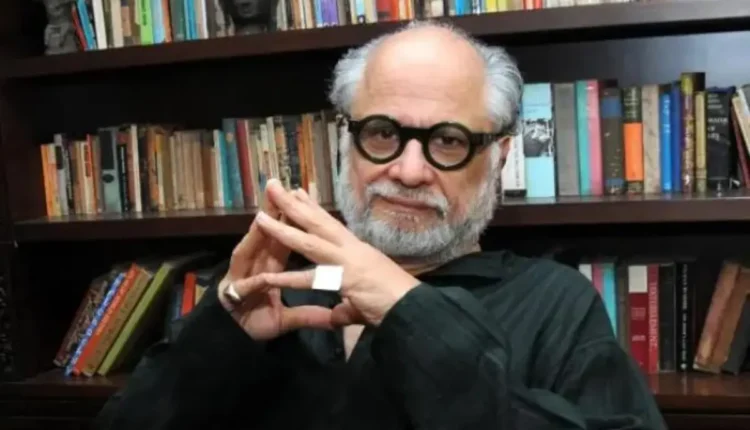In the vast landscape of intellectual discourse, few figures stand as tall as Homi Bhabha, an eminent Indian-British scholar and critical theorist born on 1st November 1949. Holding the prestigious Anne F. Rothenberg Professorship of the Humanities at Harvard University, Bhabha has etched his name indelibly in the annals of contemporary postcolonial studies.
Early Life and Education
Homi Bhabha’s intellectual odyssey began in Bombay, India, where he emerged from a Parsi family. His academic pursuits led him to Elphinstone College at the University of Mumbai for his B.A. and subsequently to Oxford University for an M.A., M.Phil., and D.Phil. in English Literature from Christ Church.
This academic journey laid the foundation for a prolific career that would redefine the discourse on colonialism.
A Storied Career
After more than a decade of lecturing at the University of Sussex, Homi Bhabha ascended to senior fellowship at Princeton University and the prestigious Old Dominion Visiting Professorship.
His scholarly journey continued with the Steinberg Visiting Professorship at the University of Pennsylvania and a faculty fellowship at Dartmouth College’s School of Criticism and Theory. Notably, from 1997 to 2001, he held the esteemed position of Chester D. Tripp Professor in the Humanities at the University of Chicago.
Homi Bhabha’s global impact extended to University College, London, where he served as a distinguished visiting professor in 2001–02. Since 2001, he has graced Harvard University as the Anne F. Rothenberg Professor of English and American Literature and Language.
His editorial contributions include being part of the Editorial Collective of Public Culture, a journal published by Duke University Press. Recognizing his profound influence, the Indian government awarded him the Padma Bhushan in 2012.
Unveiling Concepts: Hybridity, Ambivalence, Mimicry, and More
1. Hybridity
Homi Bhabha’s intellectual tapestry is woven with the concept of “hybridisation.” Building on Edward Said’s groundwork, he elucidates the emergence of new cultural forms from multiculturalism. Bhabha challenges the notion that colonialism is confined to the past, asserting that its histories and cultures continually intrude on the present, compelling a reevaluation of cross-cultural relations.
2. Ambivalence
Central to Homi Bhabha’s framework is the idea of ambivalence within culture, portraying it as a realm of opposing perceptions and dimensions. The duality inherent in ambivalence allows the colonized to embody a hybrid identity, straddling their cultural roots and the cultural identity imposed by the colonizer.
3. Cultural Difference, Enunciation, and Stereotype
Homi Bhabha introduces cultural difference as a dynamic alternative to the static concept of cultural diversity. Enunciation, the act of expression in the Third Space, becomes pivotal in recognizing cultural difference as a discursively constructed process rather than a predetermined entity.
4. Mimicry
Mimicry, a metonym of presence, unfolds when members of a colonized society imitate the culture of the colonizers. Bhabha interprets mimicry as a complex strategy that appropriates the Other while simultaneously visualizing power. It is a sign of double articulation, revealing the ambivalence within colonial discourse.
5. Third Space
The Third Space, an ambiguous zone arising from cultural interactions, challenges the historical identity of culture as a homogenizing force. It disrupts the narrative of the Western written in homogeneous time, introducing a contradictory and ambivalent space of enunciation.
Influences and Legacy
Homi Bhabha’s work is deeply rooted in post-structuralism, drawing inspiration from luminaries such as Jacques Derrida, Jacques Lacan, and Michel Foucault.
Notably, Edward Said stands as the writer who has most profoundly influenced Bhabha’s intellectual journey. In the realm of social sciences, Edward W. Soja has adeptly relied on and transformed Bhabha’s approaches to understanding notions of space, action, and representation.
Personal Touch
Beyond the scholarly arena, Homi Bhabha’s personal life reflects a vibrant blend of academia and culinary passion. Married to attorney and Harvard lecturer Jacqueline Bhabha, the couple shares a life filled with intellectual discourse and gastronomic delights. Their three children, Leah, Ishan, and Satya, add to the richness of their familial tapestry.
Bhabha, known for his penchant for hosting dinner parties, has a culinary philosophy that mirrors his intellectual depth. He prefers to cook meat with bones, emphasizing, “It’s the bones that make a dish. I always use the bone, never without.”
Also Read: Portonovo Ayyaswamy: Pioneering Innovations in Mechanical Engineering

